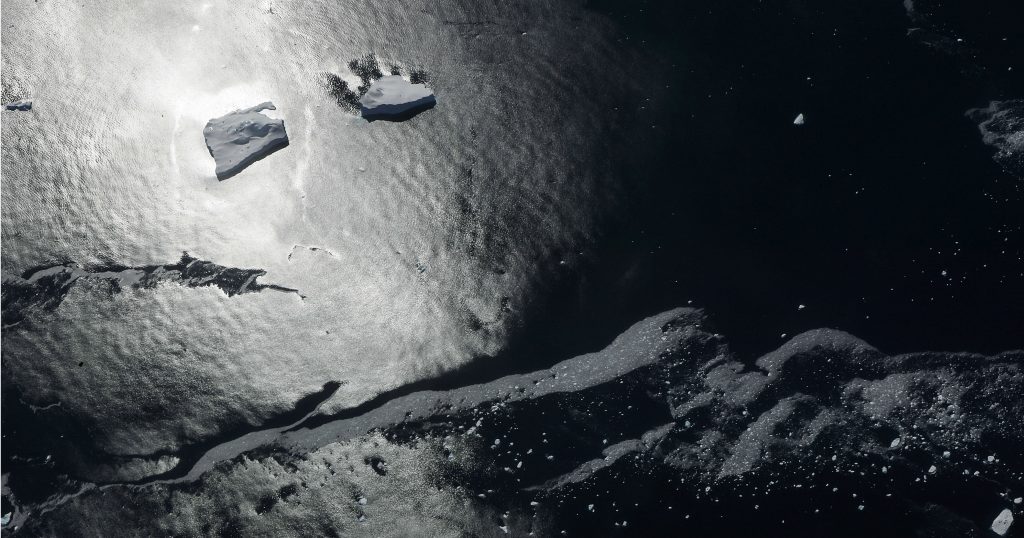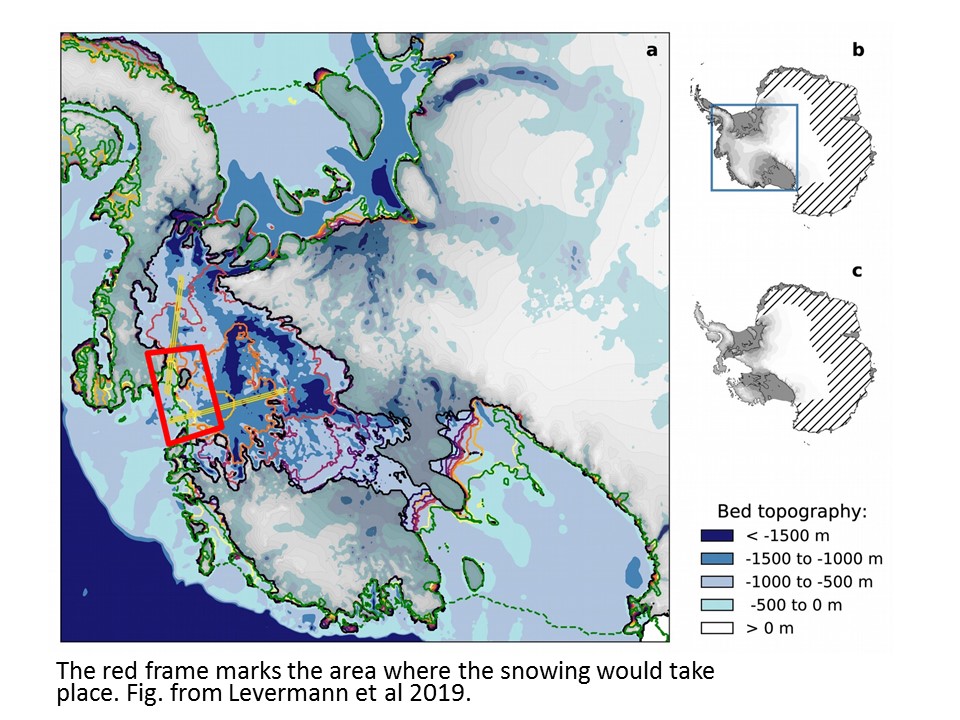Could snow cannons in Antarctica help avert catastrophic sea level rise?

A team of climate scientists has put forward a daring solution to the instability of the West Antarctic Ice Sheet — using cannons to firehose the region with trillions of tons of artificial snow — a solution they describe as both “terrible” and an example of the kind of drastic decisions the global community will increasingly be faced with as the climate warms.
“It’s a terrible thing to do, and I’m not really proposing this, but what I, as a scientist, have to do is lay out the options that society has in order to counter this situation that we have,” said Anders Levermann, the head of the department of Complexity Science at the Potsdam Institute for Climate Impact Research in Germany, in a telephone interview with Eye on the Arctic.
Levermann, along with colleagues Johannes Feldmann and Matthias Mengel, published a paper, “Stabilizing the West Antarctic Ice Sheet by surface mass deposition,” outlining their project that was published in the journal Science Advances in July.
Coastal cities threatened
Ocean warming is having an ongoing effect on the West Antarctic Ice Sheet. Research has found that some 24 per cent of the West Antarctic Ice Sheet has become unstable. Some of that ice is now drifting out into the ocean.
“In the Arctic in the North, the ice is actually floating on the ocean so therefore it has replaced all the water it will take when it melts,” says Levermann. “But in the Antarctic we have a completely different situation. The ice is on land. It is a four-kilometre high ice sheet on a continent that is as big as North America.
“It’s actually being pressed by its own gravity out into the ocean and will elevate sea levels by more than three metres over the course of several centuries,” says Levermann. “That’s a long time into the future, but it will happen.”

The sea level rise will have catastrophic effects around the world, say the researchers.
“It is about global metropolises, from New York to Shanghai, which in the long term will be below sea level if nothing is done,” said Levermann in a news release. “The West Antarctic Ice Sheet is one of the tipping elements in our climate system. Ice loss is accelerating and might not stop until the West Antarctic ice sheet is practically gone.”
Are snow cannons the answer?
To examine solutions, the researchers did computer simulations of future dynamic sea ice loss in Antarctica.
Greenhouse gas emission reductions may not be enough to reverse the trend. But blasting several hundred billion tons of artificial snow per year over several decades could.
The snow would be made from desalinated sea water.

“The idea of the plan is to replace the ice melted away at the bottom, by snow on the top, and thereby push down the ice sheet again on to the ground and thereby stabilize it,” Levermann said.
However, the researchers stress that this approach would have disastrous effects on the antarctic environment, and that powering the cannons and gathering and desalinating the sea water to make the artificial snow would require electric power equal to “several ten thousand high-end wind turbines.”
“The endeavour that has to be undertaken is so huge that you could easily compare it to an antarctic moon station because it will be very, very expensive and devastating for the nature of the region,” Levermann said.

For more on climate change, sea levels and how the Arctic and Antarctic are impacting it all, listen to Eye on the Arctic’s interview with Anders Levermann from the Potsdam Institute for Climate Impact Research:
Hard decisions ahead
Levermann says that even meeting emissions targets now wouldn’t be enough to restabilize the West Antarctic Ice Sheet, and that he hopes the paper shows the kinds of huge decisions the global community will be forced to make in the decades ahead as climate change alters the world environment.
“If we get 3.5 meters sea level rise from West Antarctica, plus the thermal expansion of the ocean, plus the Greenland melt that we observe, plus the mountain glaciers that are melting that we observe, we end up with at least 5 metres of sea level rise globally over the course of several centuries,” Levermann said. “Even if we keep the Paris climate agreement, we have to deal with the climate change we’ve already caused.
“If we continue to emit carbon, we’ll have to deal with even more consequences,that we most likely are not going to be able to deal with really.”
Write to Eilís Quinn at eilis.quinn(at)cbc.ca
Related stories from around the North:
Canada: Warming Arctic shrinking Canadian glaciers at alarming rate says study, Eye on the Arctic
Finland: Reindeer struggling to stay cool as unusual heat hits northern Finland, Yle News
Greenland: July may surpass hottest month in recorded history says World Meteorological Organization, Eye on the Arctic
Iceland: Iceland glacier lost to climate change to get memorial ceremony this month, Eye on the Arctic
Norway: Arctic summer 2019: record heat, dramatic ice loss and raging wildfires, The Independent Barents Observer
Russia: Nearly 3,000 people, 50 aircraft mobilized to fight wildfires in Russia, Eye on the Arctic
Sweden: Local councils in Sweden more interested in climate change preparedness, Radio Sweden
United States: 2019 Arctic wildfire season ‘unprecedented’ say experts, Eye on the Arctic



